a cap of night
cold and icy swept by tangles of wire
and rickets
the unsettled courses the many empty hands
of the workers leaving empty factories
forever
Read more“Leveler” was coined in the 17th century to describe those who tore down hedges in the Enclosure Act Riots. It was later generalized. As long as the working-classes have sought political and economic leveling these aspirations have been expressed in art and culture – from the social gospel of Matthew to the gestures of punk and early Hip Hop. Aesthetic leveling can be used in ways that divert class anger toward the wrong targets or toward personalized solutions. But it also can express movement toward proletarian consciousness. And the socially promiscuous artist – coming from, and historically mixing with, all classes – is often predisposed toward leveling (as well as a political volatility that produces the aforementioned variations).
Read more“No one today can reasonably doubt the existence or the power of the spectacle; on the contrary, one might doubt whether it is reasonable to add anything on a question which experience has already settled in such draconian fashion.” – Guy Debord, Comments on the Society of the Spectacle, 1989
Within five years of writing these lines, Guy Debord – author, filmmaker, and leader of a coterie of radical intellectuals known as the Situationist International – despairing at the ever quickening advance of the society he opposed, brought his own life to an end. He had lived long enough to see the collapse of the bipolar world order of the Cold War and the Americanization of the world.
Read moreThere are different methods of celebrating an anniversary. There is that which looks back with pure nostalgia; a soft, uncritical reification that half expects time to repeat itself. It is safe to say that the vast majority of anniversaries are celebrated in such a way.
Then there is the method of commemoration that looks forward, that intrinsically understands history as a constant process, unfolding in this way or that depending on who pushes, who is pushed, and whether they are willing to push back. Not events as blueprints, but as ruptures and openings though which we can see a different future.
Read moreWhen I was a kid, I read a spoof in a nickelodeon about what it was like to watch a World War Two film with a German Shepherd. The punchline was that the dog always rooted for the wrong side. Viewing Hulu’s adaptation of Margaret Atwood’s 1985 sci-fi novel, The Handmaid’s Tale, I couldn’t help but to think of all the viewers who were sharing a sofa with friends, family, and lovers, who, openly or not, may view Gilead, the theocratic, dystopic, man-scape setting for the story, with a palate falling well short of the distaste intended by the filmmakers.
Read more


